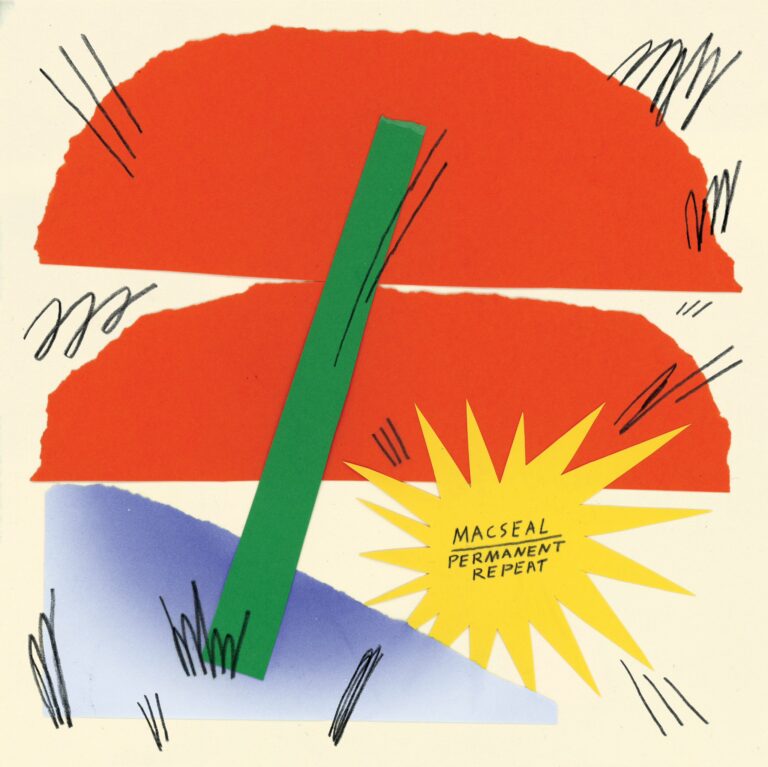By Max Cohen
Macseal used to riff nasty. Their formative EPs were stuffed with twinkly call and response hooks that all had the “Never Meant” appeal; complicated, sometimes skipping a beat, but so memorable you could “doo doo deee doo” your way through them no problem. What elevated the guitarwork was the two frontmen’s seamless vocal blend, their shouty harmonies giving their lonely vignettes some levity. Nine years after Macseal’s first release, the Long Island band has mostly left behind their key tricks as they try to fight against a universal struggle—getting old.
Lead single “Golden Harbor” finds Cole Szilagyi “aging and desperate to ignore / every day that never was.” The follow up, “Four Legs,” shows a recently married Ryan Bartlett meeting his baby niece for the first time and “freaking out.” Settling into adulthood, straddling a genre dominated by self-centered, immature dudes, how’s an emo supposed to grow up? And how should their sound change to reflect it?
Consider two opposing case studies: Jake Ewald, formerly of Modern Baseball, and his thriving indie outfit Slaughter Beach, Dog have gracefully entered a humanistic folk arc with no trace of adolescent angst. Meanwhile Jeff Rosenstock has stayed Punk, wielding his expanded skillset as a composer to grow more unhinged with time. Both approaches work because they feel like honest progressions of the musicians’ cultivated identities—candid storyteller and righteous DIY ragelord.
Permanent Repeat tries to split the difference, using a radio-ready 2000’s soft rock sound to cope with adult anxieties while not totally abandoning Macseal’s mathy roots. There’s less riffing but their songs feel renewed from the deeper, layered arrangements. Guided by producer Billy Mannino, a frequent Oso Oso collaborator, this is the most well adorned a Macseal record has ever been, with plucky mandolins, synths, sleigh bells, bongos and whirring delay effects peeking out across the careful mix. It’s a sign, and a great benefit, of their maturity. They’re clearly comfortable in the studio, more assured and willing to experiment without losing themselves in the process.
“Golden Harbor” is the most obvious bridge between where they’ve been and where they’re going with a relaxed hook and double guitar solo more boppable than shreddy. Their self-deprecating charm has stayed as they fondly look back on early gigs: “No one’s showing up / so we treat it like practice.” The smooth Coldplay harmonies on “Beach Vacation” lean a little poppier, but the track still feels in conversation with most of their last album. Even “Dinner for Two,” which flirts with being a Billy Joel love song, has their familiar, jittery energy.
The half-send on this new nostalgic sound makes sense considering Macseal has always written about feeling stuck in the middle. It was true on their EPs. It was true for Super Enthusiast, which caught the band between college and the rest of life to come. And it’s true for album apex “Easily Undone,” a song about freezing up in the face of big adult choices. What’s ironic is that this non-committal banger is their most decisive, fully realized take on throw-back pop. Save for the quick hiccup of a time signature change in the outro, there’s no emo here at all. Complete with a well placed drum loop and Szilagyi’s strongest chorus to date, it sounds more like if the Goo Goo Dolls tried to write “Steal my Sunshine.” You can imagine pressing your head against the backseat window and crying along.
Permanent Repeat is bright and gentle to a fault. Even on the record’s one true ripper, “Your Door,” the vocals flip in and out of falsetto. The album starts to wear when the sweetness gets stale to the ears. “October” is a sappy, unnecessary interlude that doesn’t help the title track at all. And the chorus of “Four Legs” is too high for Bartlett’s rougher voice, especially without Szilagyi there to ground him. Macseal’s secret weapon was their harmonies, it’s a mistake that most songs spotlight one individual singer and not the pair together.
Closing track, “Afloat” sums up the album’s attitude on getting older. It’s about a band that gigs in bars for spare change and hangs out in a diner waiting for bigger things. Cut to two years later and the musicians have families, the diner has closed and the band’s gone nowhere. The story seems like a depressing reflection on Macseal’s own status, a confession they’re “past their prime.” But the band plays it like an anthem—the airy flute samples and swelling outro jam are triumphant, each line of the chorus is punctuated by a full chest “Yeah!” It’s a radically optimistic, very grown up take on a dream defeated.
Nostalgia often feels like a dirty word, a sign of stagnancy. But for Macseal it signals a shift in perspective, a moving away from their teenage anger. Even if the sound has been done before, Permanent Repeat touts some of the band’s most lush, catchy and distinct music so far. They know the let-downs won’t stop coming, but they will get more bearable with age. Why choose to feel disappointed when everything is sweeter in retrospect?



